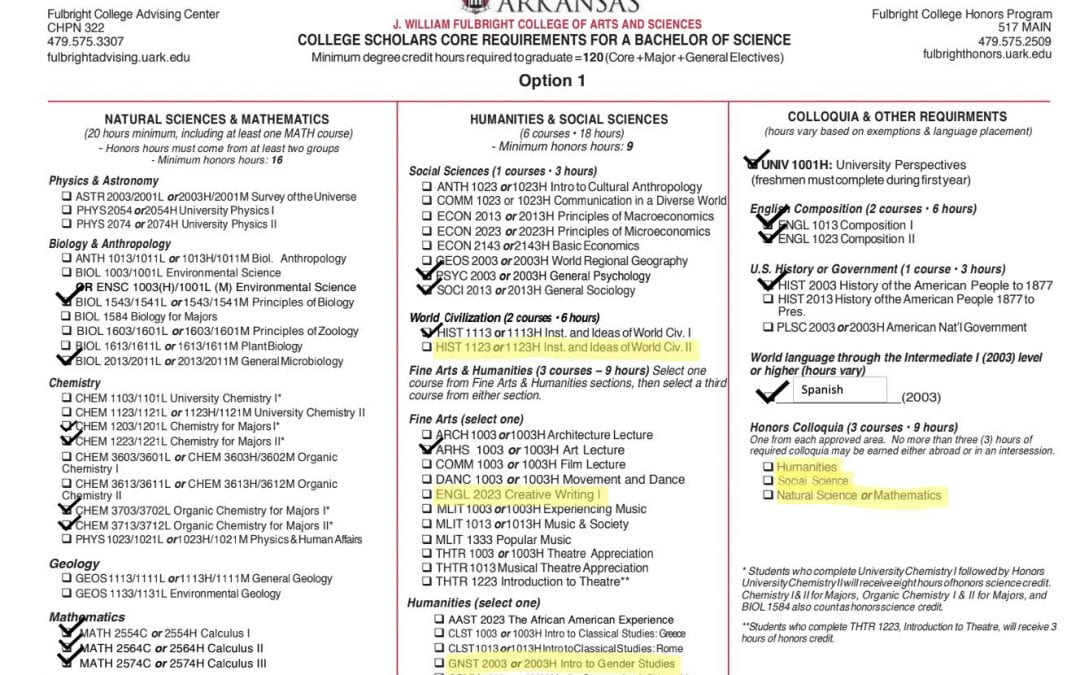By Mia Alshami
Your first advising appointment as a freshman is required, and it can be a little intimidating. However, you don’t need to stress about it! Your advisors are there to help you, and the Fulbright College Honors Program has an amazing advising team to help you through every step of the way. This initial meeting, Foundation Session, or email advising is going to introduce you to the people that are going to help you graduate, so being prepared is key to making it as successful as possible. Here are the things you should do in order to prepare for your appointment:
1. Use the FCHP Checklist
I am a junior, and I still look at this checklist before every time I need to register for classes. The team at the Fulbright College Advising Center has made a beautiful document that clearly outlines every single requirement you need in order to graduate with honors, and it is a great resource to have! As you go along throughout your college career, be sure to check off the classes that you have already taken and highlight the ones you want to take in the future. This is an awesome resource to use throughout all of undergrad. I have included a picture of mine below. Of course, I have a lot of check marks because I have taken a lot of classes. However, I have also highlighted the classes I still need to take/want to take so I know to take them in the upcoming semesters. I would highly recommend doing this!
To find your own Degree Check Sheet, visit the Fulbright College Honors Program website! You can find your specific check sheets by choosing the year your started at the U of A and selecting your core, major, and minor check sheets!
2. Look at your degree audit
After the university and honors requirements, the next most important thing to look at is your degree audit on UAConnect. This resource clearly outlines the specific classes you still need to take in order to graduate with your intended major. It will also indicate the classes that you have already taken with the grade you received. Looking at this resource will become more important as you progress through undergrad, but it is still important to be aware of it right now as a freshman so you don’t get too far off track. You can also press the “what if” button on the degree audit page to see a theoretical degree audit for a degree you haven’t formally declared if you are considering switching majors. For example, if you are a chemistry major right now but are thinking of switching to biology, you can look at both of those degree requirements using the “what if” feature in the degree audit section. When you do, you will see that University Chemistry I and II are required for both degrees, so you should take those classes. Looking at these requirements will help you formulate what classes you need to take next semester and in upcoming semesters afterwards.
Your degree audit is also where you will see how all of your AP, IB, CLEP, and transfer credit has been applied to your degree at the U of A! If you are missing some of those credits from your degree audit, you will want to reach out the institutions granting that credit immediately so that you don’t fall behind waiting on your transfer credits to post!
3. Make an 8-semster plan
This may seem really intimidating, and it was really intimidating to me at first as well, but this will be extremely helpful because you will have all of the classes you need to take in one place. I created an excel document with each semester as a separate column. Under each column, I have the classes that I need to take that semester. Class lists and offerings change each semester, so keeping it as general as possible will be helpful. I first went through my degree audit to see which classes I need to take each semester and put those in first. Also, each department has a degree plan on the Catalog of Studies that suggests when you should take each class. Although this is just a suggested plan, it will definitely help you in creating your own unique 8-semester plan. Next, I went through the honors requirements and placed when I should take them. For this, I made it more general by putting “Honors Humanities Course” or “Honors Colloquia” because these class offerings change, and it is more up to you to choose which class you want to take when. My 8-semester plan has probably changed at least 20 times since I first made it, but constantly updating it and using it will help you stay on track for all of undergrad. I have included a template 8 semester plan that you can use! In the “Required?” column, I would suggest putting why it is required, whether it be for the honors requirements or your major requirements. This will help you visually see why you need to take each class.
4. Use the Schedule Planner
The schedule planner is an awesome tool that helps you customize your schedule the way you want it. Just put in the classes you want to take, and it will automatically generate tons of schedules for you to choose from. If you don’t like the schedule you got or if there are conflicts, go back to your 8-semester plan and switch around some of the classes or go back to the checklist of honors requirements and choose another class. This will give the best schedule for you, and it will also keep you on track to get your degree.
The Associate Director of Fulbright Honors Jill Wheeler made a great video on how to use Schedule Planner that you can watch if you aren’t sure where to start!
5. Do all of this prep work BEFORE you request advising!
This is probably the most important step! Being on time is really important because advisors have a very tight schedule, so the more prepared you are for advising, the more your advisor will be able to help you and make additional recommendations. To be sufficiently prepared for advising, you need to at least have a few courses in mind for the next semester, but the best advising appointments happen when you show up with a full schedule you have made on Schedule Planner! One time, I showed up to my advising appointment with a lot of hard classes, including three labs. My advisor took one look at it and told me that I needed to change it because it was way too hard. I wouldn’t have known that I was overstretching myself if I didn’t show up prepared to my advising appointment and I would have taken some really hard classes. The amount of preparation you do before your advising appointment is indicative of how much you are going to get out of it.
I hope this advice has been helpful to you! As you can see from what I have written, I am really Type A. I am also paranoid that I am going to not take that one class I need to take to graduate and I won’t find out until it is too late. Feel free to reach out to me at malshami@uark.edu if you have any questions or would like advice on anything I have talked about. I wish you the best of luck for your advising appointment!
Priority registration for most Honors Students begins next week! If you still have an advising hold on your account, look back through your email for messages from your advisor on how to schedule an appointment! This close to the registration date, you likely will not be able to have a face-to-face appointment with your advisor, and may need to get advised via email instead. Again, check your email–most advisors have a specific form for email advising that they have already sent out!




